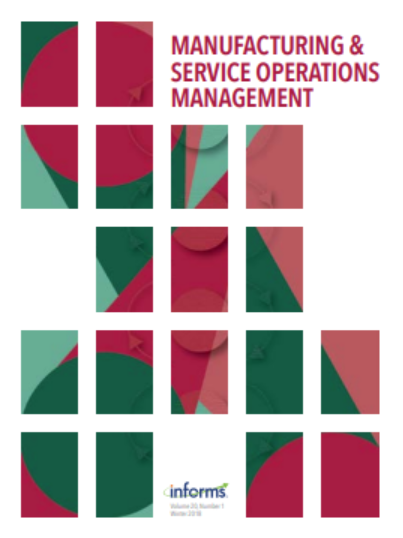拓展还是深入?在线零售中的分类策略与订单履行
IF 4.8
3区 管理学
Q1 MANAGEMENT
M&som-Manufacturing & Service Operations Management
Pub Date : 2023-05-01
DOI:10.1287/msom.2022.1156
引用次数: 0
摘要
问题定义:在线零售商在产品分类上的扩张常常会带来运营上的挑战。在进行这种扩张时,零售商需要在扩大商品种类的宽度和深度之间做出战略选择。我们对这种选择如何影响订单履行过程的理解是有限的。因此,我们研究了分类策略的这些维度对订单交付及时性的影响。学术/实践相关性:订单交付及时性是衡量在线零售业务成功与否的关键指标。本文采用零售商分类策略的多维视角,研究分类宽度和深度对订单交付时效性的相对影响,为理论和实践提供了有益的借鉴。方法:采用包含超过2亿订单的数据集,我们使用工具变量方法研究分类策略对交付及时性的影响。然后,我们利用两阶段模型来估计交付绩效对销售的影响。此外,我们采用了一个匹配的差中差和一个新的贝叶斯结构时间序列模型来证实这种关系。结果:与分类深度相比,分类宽度对订单交付及时性的负向影响更大。分类宽度每增加一个标准差,平均交货时间就会增加0.55天。此外,我们发现这种影响被订单的平均规模正向调节(即恶化),并被物流服务提供商(LSP)的经验负向调节(即改善)。最后,10%的订单每增加一天的交货时间,销售额就会减少2.7%。管理启示:我们的研究结果表明,专注于确保及时交货的在线零售商应该警惕不断扩大的产品种类,特别是当面临更大的平均订单规模时。我们还发现,经验丰富的物流服务提供商可以帮助缓解分类宽度扩展的延迟效应。然而,经验丰富的lsp的好处是有限的零售商深化他们的分类。历史:本文已被接受为2018年MSOM数据驱动研究挑战赛的一部分。补充材料:在线附录可在https://doi.org/10.1287/msom.2022.1156上获得。本文章由计算机程序翻译,如有差异,请以英文原文为准。
Go Wide or Go Deep? Assortment Strategy and Order Fulfillment in Online Retail
Problem definition: Expansions in product assortment by online retailers often engender operational challenges. In undertaking such expansions, retailers exercise a strategic choice between expanding assortment width or depth. Our understanding of how this choice affects the order fulfillment process is limited. Thus, we examine the impact of these dimensions of assortment strategy on order delivery timeliness. Academic/practical relevance: Order delivery timeliness is a critical measure of operational success in online retail. We contribute to theory and practice by adopting a multidimensional perspective of retailer assortment strategy and studying the relative impact of assortment width and depth on order delivery timeliness. Methodology: Employing a data set comprising more than 200 million orders, we study the effects of assortment strategy on delivery timeliness using an instrumental variable approach. We then utilize a two-stage model to estimate the impact of delivery performance on sales. Further, we employ a matched difference-in-differences and a novel Bayesian structural time-series model to confirm this relationship. Results: We find that assortment width has a greater negative impact on order delivery timeliness compared with assortment depth. A one-standard-deviation increase in assortment width increases average delivery times by 0.55 days. Further, we find this effect to be positively moderated (i.e., worsened) by the average size of orders and to be negatively moderated (i.e., improved) by the logistic service provider’s (LSP) experience. Finally, a one-day increase in delivery times for 10% of the orders results in a 2.7% reduction in sales. Managerial implications: Our findings suggest that online retailers focused on ensuring timely deliveries should be wary of widening product assortments, especially when facing larger average order sizes. We also find that experienced logistic service providers can help mitigate the dilatory effects of assortment width expansions. However, the benefits of experienced LSPs are limited for retailers deepening their assortments. History: This paper has been accepted as part of the 2018 MSOM Data Driven Research Challenge. Supplemental Material: The online appendices are available at https://doi.org/10.1287/msom.2022.1156 .
求助全文
通过发布文献求助,成功后即可免费获取论文全文。
去求助
来源期刊

M&som-Manufacturing & Service Operations Management
管理科学-运筹学与管理科学
CiteScore
9.30
自引率
12.70%
发文量
184
审稿时长
12 months
期刊介绍:
M&SOM is the INFORMS journal for operations management. The purpose of the journal is to publish high-impact manuscripts that report relevant research on important problems in operations management (OM). The field of OM is the study of the innovative or traditional processes for the design, procurement, production, delivery, and recovery of goods and services. OM research entails the control, planning, design, and improvement of these processes. This research can be prescriptive, descriptive, or predictive; however, the intent of the research is ultimately to develop some form of enduring knowledge that can lead to more efficient or effective processes for the creation and delivery of goods and services.
M&SOM encourages a variety of methodological approaches to OM research; papers may be theoretical or empirical, analytical or computational, and may be based on a range of established research disciplines. M&SOM encourages contributions in OM across the full spectrum of decision making: strategic, tactical, and operational. Furthermore, the journal supports research that examines pertinent issues at the interfaces between OM and other functional areas.
 求助内容:
求助内容: 应助结果提醒方式:
应助结果提醒方式:


